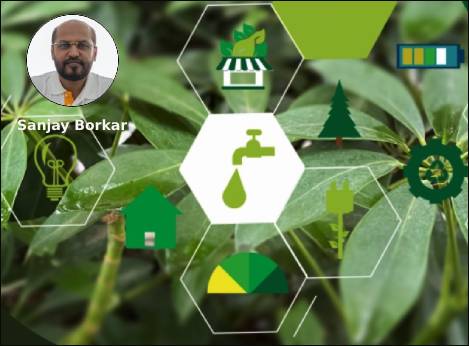
By Sanjay Borkar, CEO & Founder, FarmERP
October 29 2021: Digital Agriculture in today’s time may not change the way farmers operate or function, although it will end up transforming and updating every aspect of the Agri-Value Chain. This is not only necessary to resolve problems that surround the agriculture sector but also helps treat global issues such as hunger or food security.
Digital Agriculture encompasses multiple technologies with various applications such as Cloud Computing, AI, Machine Learning, Deep Learning, IoT, and various others. These technologies are put to use in order to gather, store, analyze, understand, and also share agriculture-related data and information on a digital platform across the globe with various Agri-Stakeholders.|
This kind of information-sharing feature along with other offerings such as Sensors, Cameras, Drones, Satellite Imagery, IoT devices, Artificial Intelligence, and so on, can not only assist a farmer with his harvest and ensure efficiency, predictability, and profitability in the entire farming process but can also assist the farmers & Agri-Stakeholders into formulating rapid decisions around agriculture. Not to forget the massive amount of data that exists at their disposal by the end of the day, which traditionally was not possible.
According to Dr. Gajendra Pratap Singh, Principal Investigator & Scientific Director at DiSTAP, there are 3 main components that cause the digital revolution in agriculture.
- Availability of Economical and Portable Sensors that can help Agri-Stakeholders to monitor their farm management and activities.
- Today technology has made it possible for various Agri-Stakeholders and Farmers to stay in touch with one another and share relevant farm-related data and information.
- Availability of Data Analytics such as as AI that helps with better productivity
Over the years, agriculture has been a witness to a series of revolutions that have successfully driven it towards efficiency and higher profitability. However, the rise of digital agriculture could also be transformative and disruptive - if not used in its true spirit.
Annually across the globe over 600 million cases of foodborne illnesses are registered every year. Food Safety was always important but over the years, it has lost its importance. Lack of food safety is leading to issues related to food security and nutrition, worldwide.
By 2050, the population across the globe is expected to rise by 40%, and to feed these many people, FAO (Food and Agriculture Organisation) predicted that Agri-businesses would have to produce 70% more food of what has been already produced.
Agri-value chain
To attain this goal, it is crucial for Agri-Stakeholders to not only understand but also implement digital agriculture at every step of the agri-value chain, be it harvest, production, post-production, storage, or even distribution. Upon successful application of digital agriculture, the agriculture sector can soon cater and deliver to FAO’s prediction and also help improve food security on a global scale.
There are various ways for one to step into digital agriculture and assist in resolving issues around agriculture at a grass-root level. Some are FPC’s, ERP’s, IoT’s, and many others.
To improve and enhance the functioning of the agriculture processes right from harvesting to distribution, a farmer or an enterprise can take the help of an FPC, also known as Farmer Producer Companies. These act as a bridge between the cooperative societies and private limited companies offering a myriad of benefits such as, more credibility, easy management, high income, limited liability, to name a few. In short, it can ease up the entire business process entirely. People associated with FPC’s can also leverage collective strength and bargaining power to access financial or non-financial inputs, technologies, or even services that could result in economical traction costs.
Use ERP
ERP or Enterprise Resource Planning on the other hand is software that can centralize a firm’s information database, automate their routines and simplify their everyday business processes. The reason to use this tool is to optimize everyday operations and to free up labor time that could be put to use to target more instinctual tasks. Overall, it can help in increasing the revenue margin, lead to better performance, improve the customer service, scalability, flexibility, and overall better planning and functioning.
Such simple measures hold the power to change the face of agriculture tomorrow, resulting in better food production with predictable measures. In the long run, it could be a step taken to solve global health problems and target sustainable development goals.
Today in a country like India, where the majority of the economy is dependent on Agriculture, there are a couple of farm management companies that are continuously working towards the UN's Sustainable Development Goals such as Zero Hunger and Climate Change. These also drive them towards the holistic growth of agribusinesses on a global platform.
By utilizing such measures using all the opportunities provided to the agriculture sector like FPC’s, IoT’s, Machine Learning, Deep Learning, Climate Smart Advisories, and so on, one can not only enjoy an improved harvest outcome but can also benefit from the predictability in the Agri-Sector, which in the long run will help solve global issues that surround food and health and boost up the agriculture sector as a whole.
FarmERP presently has its foothold in over 25 countries, and is a significant enterprise in the domain of AgTech, worldwide.